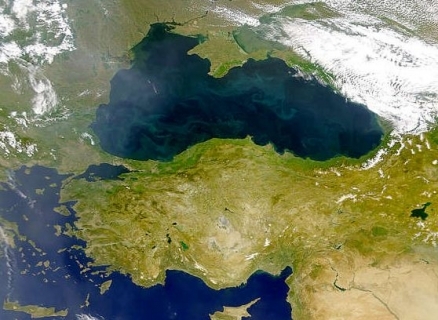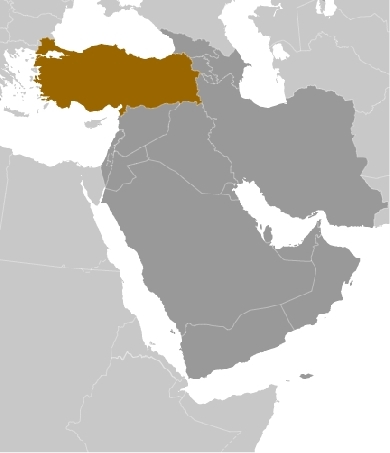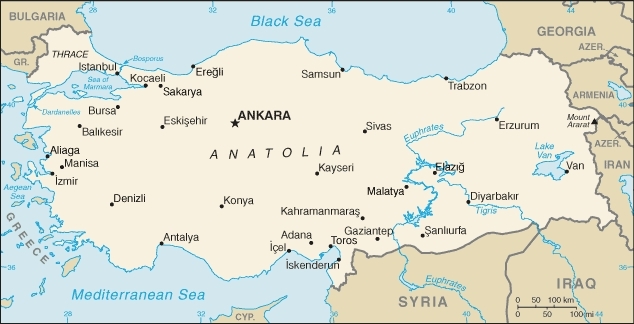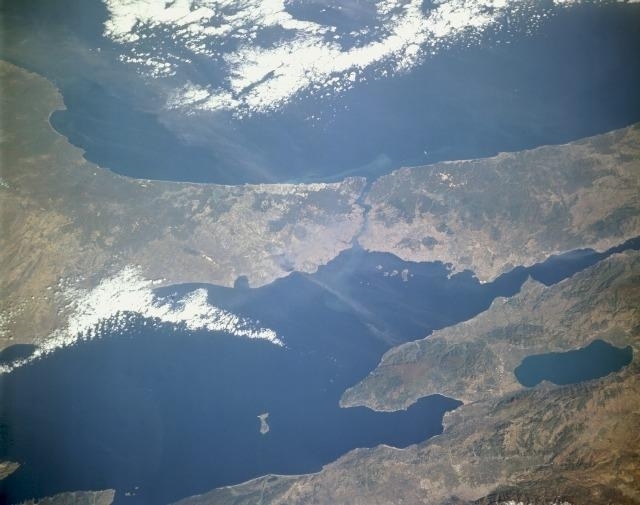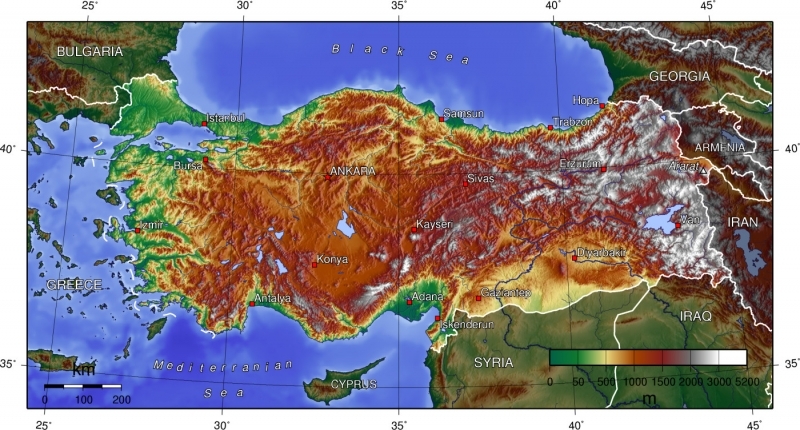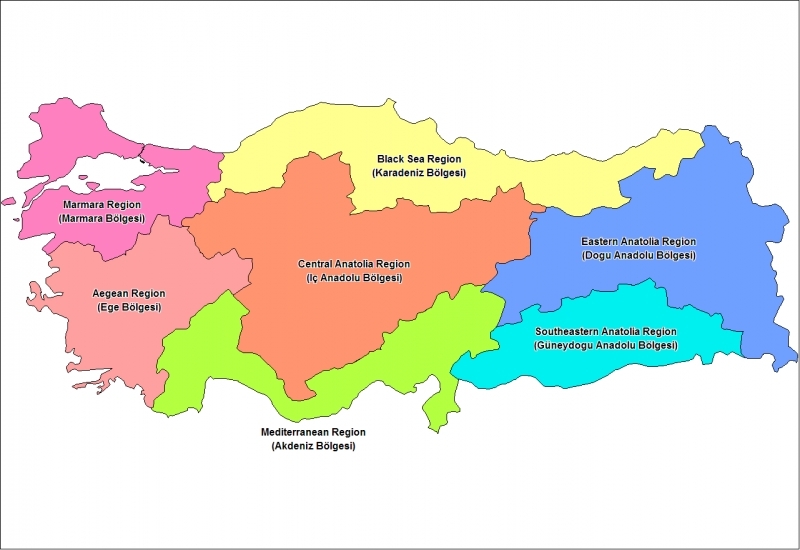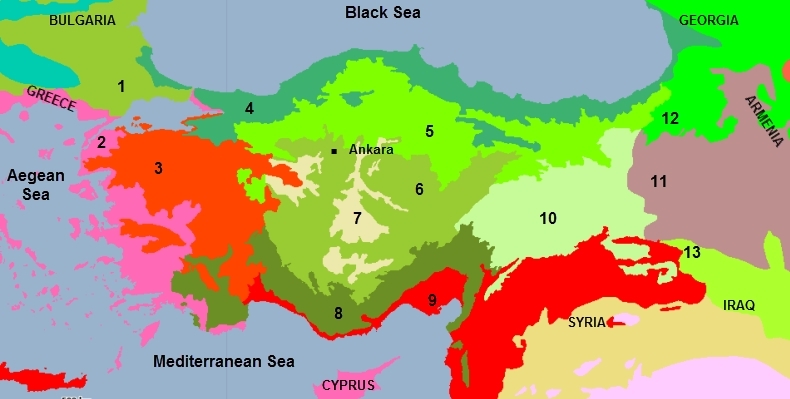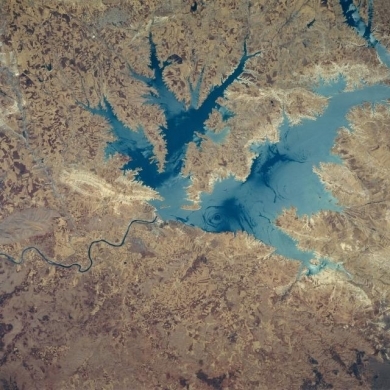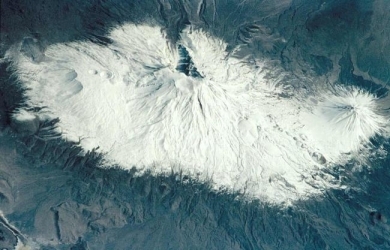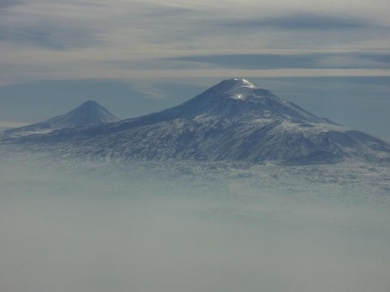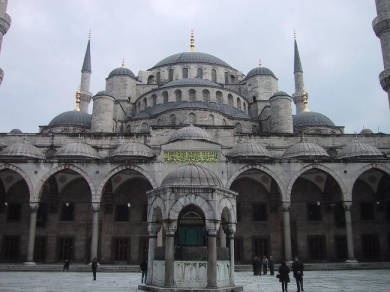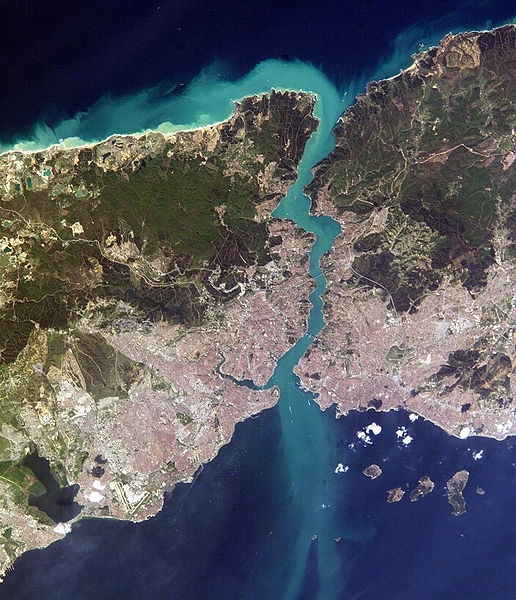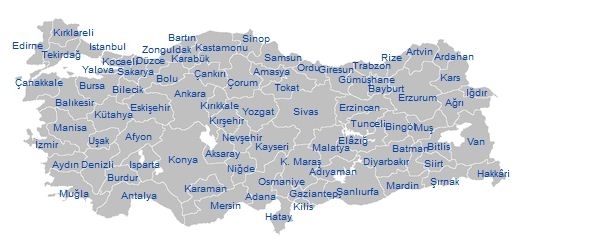Turkey (Agricultural & Resource Economics)
Contents
Turkey
Countries and Regions of the World Collection  Turkey is a nation of eighty million people in southeastern Europe and southwestern Asia (that portion of Turkey west of the Bosporus is geographically part of Europe), bordering the Black Sea, between Bulgaria and Georgia, and bordering the Aegean Sea and the Mediterranean Sea, between Greece and Syria.
Turkey is a nation of eighty million people in southeastern Europe and southwestern Asia (that portion of Turkey west of the Bosporus is geographically part of Europe), bordering the Black Sea, between Bulgaria and Georgia, and bordering the Aegean Sea and the Mediterranean Sea, between Greece and Syria.
Its major environmental issues include:
- water pollution from dumping of chemicals and detergents;
- air pollution, particularly in urban areas;
- deforestation; and,
- concern for oil spills from increasing Bosporus ship traffic
Turkey is susceptible to severe earthquakes, especially in northern Turkey, along an arc extending from the Sea of Marmara to Lake Van.
Modern Turkey was founded in 1923 from the Anatolian remnants of the defeated Ottoman Empire by national hero Mustafa Kemal, who was later honored with the title Ataturk or "Father of the Turks." Under his authoritarian leadership, the country adopted wide-ranging social, legal, and political reforms.
After a period of one-party rule, an experiment with multi-party politics led to the 1950 election victory of the opposition Democratic Party and the peaceful transfer of power. Since then, Turkish political parties have multiplied, but democracy has been fractured by periods of instability and intermittent military coups (1960, 1971, 1980), which in each case eventually resulted in a return of political power to civilians.
In 1997, the military again helped engineer the ouster - popularly dubbed a "post-modern coup" - of the then Islamic-oriented government.
Turkey intervened militarily on Cyprus in 1974 to prevent a Greek takeover of the island and has since acted as patron state to the "Turkish Republic of Northern Cyprus," which only Turkey recognizes.
A separatist insurgency begun in 1984 by the Kurdistan Workers' Party (PKK) - now known as the Kurdistan People's Congress or Kongra-Gel (KGK) - has dominated the Turkish military's attention and claimed more than 30,000 lives. After the capture of the group's leader in 1999, the insurgents largely withdrew from Turkey mainly to northern Iraq. In 2004, KGK announced an end to its ceasefire and attacks attributed to the KGK increased.
Turkey joined the UN in 1945 and in 1952 it became a member of NATO.
In 1964, Turkey became an associate member of the European Community. Over the past decade, it has undertaken many reforms to strengthen its democracy and economy; it began accession membership talks with the European Union in 2005.
Turkey has a strategic location controlling the Turkish Straits (Bosporus, Sea of Marmara, Dardanelles) that link Black and Aegean Seas.
Mount Ararat, the legendary landing place of Noah's ark, is in the far eastern portion of the country.
The Bosporus (near the center of the photograph), a strait that connects the Black Sea to the north with the Sea of Marmara to the south, stands out in this low-oblique, north-looking photograph. One of the world's most strategic waterways, the strait separates European Turkey to the west with Asiatic Turkey to the east. Istanbul (formerly Constantinople), one of the great historic cities of the world, sits near the Bosporus entrance to the Sea of Marmara. Photo courtesy of NASA.
Geography
Location: Southeastern Europe and Southwestern Asia (that portion of Turkey west of the Bosporus is geographically part of Europe), bordering the Black Sea, between Bulgaria and Georgia, and bordering the Aegean Sea and the Mediterranean Sea, between Greece and Syria
Geographic Coordinates: 39 00 N, 35 00 E
Area: 783,562 sq km(land: 769,632 sq km; water: 13,930 sq km)
Land Boundaries: 2,648 km (Armenia 268 km, Azerbaijan 9 km, Bulgaria 240 km, Georgia 252 km, Greece 206 km, Iran 499 km, Iraq 352 km, Syria 822 km
Coastline: 7,200 km
Maritime Claims:
territorial sea: 6 nm in the Aegean Sea; 12 nm in Black Sea and in Mediterranean Sea
exclusive economic zone: in Black Sea only: to the maritime boundary agreed upon with the former USSR
Natural Hazards: severe earthquakes, especially in northern Turkey, along an arc extending from the Sea of Marmara to Lake Van
Terrain: high central plateau (Anatolia); narrow coastal plain; several mountain ranges. The highest point is Mount Ararat (5,166 m).
Climate: temperate; hot, dry summers with mild, wet winters; harsher in interior.
Topography of Turkey. Source: Wikimedia Commons.
Regions of Turkey. Source: Wikimedia Commons
Ecology and Biodiversity
- Balkan mixed forests
- Aegean and Western Turkey sclerophyllous and mixed forests
- Anatolian conifer and deciduous mixed forests
- Euxine-Colchic deciduous forests
- Northern Anatolian conifer and deciduous forests
- Central Anatolian deciduous forests
- Central Anatolian steppe
- Southern Anatolian montane conifer and deciduous forests
- Eastern Mediterranean conifer-sclerophyllous-broadleaf forestsEastern Anatolian deciduous forests
- Eastern Anatolian montane steppe
- Zagros Mountains forest steppe
- Caucasus mixed forests
See also:
- Black Sea large marine ecosystem
- Göreme National Park and the Rock Sites of Cappodocia
- Hierapolis-Pamukkale
- Biological diversity in the Irano-Anatolian
- Biological diversity in the Mediterranean Basin
| This northeast-looking view shows the Ataturk Reservoir and Dam, presently the largest man-made lake in Turkey. Located in south central Turkey on the Euphrates River, Ataturk Reservoir was completed in the early 1990's. The meandering Euphrates River (dark line) can be seen exiting the scene below the left center of the image. Smooth lake waters appear as dark blue, while wind-roughened waters appear light blue. The light area to the west of the dam (left center) is where rocks were quarried for the construction of the dam. Photo courtesy of NASA. |
| Mount Ararat (5,166 m, 16,949 ft) is the largest volcano in Turkey, but is not currently active. It is located in extreme northeastern Turkey, near the borders with Iran and Armenia. Southwest of the main peak lies Lesser Ararat (3,896 m, 12,877 ft). Ahora Gorge is a northeast-trending chasm dropping from the top of the mountain. Claims by different explorers to have found remnants of Noah's Ark on Mount Ararat have led to continuing expeditions to the mountain, many focusing their searches on the gorge area. Photo courtesy of NASA. |
| Mount Ararat (5,166 m, 16,949 ft) is the largest volcano in Turkey, but is not currently active. It is located in extreme northeastern Turkey, near the borders with Iran and Armenia. Southwest of the main peak lies Lesser Ararat (3,896 m, 12,877 ft). Ahora Gorge is a northeast-trending chasm dropping from the top of the mountain. Claims by different explorers to have found remnants of Noah's Ark on Mount Ararat have led to continuing expeditions to the mountain, many focusing their searches on the gorge area. Photo courtesy of NASA. |
| The Sultan Ahmed Mosque (also known as the Blue Mosque) in Istanbul is the national mosque of Turkey. |
People and Society
Population: 79,749,461 (July 2012 est.)
Modern Turkey encompasses bustling cosmopolitan centers, pastoral farming villages, barren wastelands, peaceful Aegean coastlines, and steep mountain regions. More than 70% of Turkey's population lives in urban areas that juxtapose Western lifestyles with more traditional ways of life.
The Turkish state has been officially secular since 1924. Approximately 99% of the population is Muslim. Most Turkish Muslims follow the Sunni traditions of Islam, although a significant number follow Alevi and Shiite traditions. Questions regarding the role of religion in society and government, the role of linguistic and ethnic identity, and the public's expectation to live in security dominate public discourse. There are at least 12 million Turkish citizens who assert a Kurdish identity, making them the largest ethnic minority in Turkey.
Ethnic Groups: Turkish 70-75%, Kurdish 18%, other minorities 7-12% (2008 est.)
Age Structure:
0-14 years: 26.6% (male 10,707,793/female 10,226,999)
15-64 years: 67.1% (male 26,741,332/female 26,162,757)
65 years and over: 6.3% (male 2,259,422/female 2,687,245) (2011 est.)
Population Growth Rate: 1.197% (2012 est.)
Birthrate: 17.58 births/1,000 population (2012 est.)
Death Rate: 6.1 deaths/1,000 population (July 2012 est.)
Net Migration Rate: 0.5 migrant(s)/1,000 population (2012 est.)
Life Expectancy at Birth: 72.77 years
male: 70.86 years
female: 74.78 years (2012 est.)
Total Fertility Rate: 2.13 children born/woman (2012 est.)
Languages: Turkish (official), Kurdish, other minority languages
Literacy (age 15 and over can read and write): 87.4% (2004 est.)
Urbanization: 70% of total population (2010) growing at an annual rate of growth of 1.7% (2010-15 est.)
History
Mustafa Kemal, celebrated by the Turkish State as a Turkish World War I hero and later known as "Ataturk" or "father of the Turks," led the founding of the Republic of Turkey in 1923 after the collapse of the 600-year-old Ottoman Empire and a 3-year war of independence. The empire, which at its peak controlled vast stretches of northern Africa, southeastern Europe, and western Asia, had failed to keep pace with European social and technological developments. The rise of national consciousness impelled several national groups within the Empire to seek independence as nation-states, leading to the empire's fragmentation. This process culminated in the disastrous Ottoman participation in World War I as a German ally. Defeated, shorn of much of its former territory, and partly occupied by forces of the victorious European states, the Ottoman structure was repudiated by Turkish nationalists brought together under the leadership of Mustafa Kemal. The nationalists expelled invading Greek, Russian, French and Italian forces from Anatolia in a bitter war. After the proclamation of the Republic of Turkey the sultanate and caliphate were abolished.
The leaders of the new republic concentrated on consolidating their power and modernizing and Westernizing what had been the empire's core--Asian Anatolia and a part of European Thrace. Social, political, linguistic, and economic reforms and attitudes decreed by Ataturk from 1924-1934 continue to be referred to as the ideological base of modern Turkey. In the post-Ataturk era, and especially after the military coup of 1960, this ideology came to be known as "Kemalism" and his reforms began to be referred to as "revolutions." The core elements of Kemalism are secularism, nationalism, statism, and identification with Europe. All of these concepts are the subject of lively debate in today’s Turkey, and the ruling Justice and Development Party (AKP) comes from a tradition that challenges many of the Kemalist precepts.
Turkey entered World War II on the Allied side shortly before the war ended, becoming a charter member of the United Nations. Difficulties faced by Greece after World War II in quelling a communist rebellion and demands by the Soviet Union for military bases in the Turkish Straits prompted the United States to declare the Truman Doctrine in 1947. The doctrine enunciated American intentions to guarantee the security of Turkey and Greece and resulted in large scale U.S. military and economic aid under the Marshall Plan. After participating with United Nations forces in the Korean conflict, Turkey in 1952 joined the North Atlantic Treaty Organization (NATO). Turkey is currently a European Union candidate.
Government
Government Type: Republican parliamentary democracy
The 1982 Constitution, drafted by the military in the wake of a 1980 military coup, proclaims Turkey's system of government as democratic, secular, and parliamentary. The prime minister serves as head of government, and the president serves as head of state. The current president, Abdullah Gul, was elected by Parliament in August 2007 for a 7-year term. Pursuant to a constitutional amendment package approved by voters in an October 2007 referendum, the president is directly elected by the voters for a term of 5 years and can serve for a maximum of two terms.
The 550-member Parliament carries out legislative functions. Pursuant to the October 2007 constitutional amendment package, members of Parliament are directly elected by the voters for a term of 4 years, although general elections may be called at any time. Seat distribution is by the D'Hondt system of party-list proportional representation in combination with a 10% popular vote threshold. To participate in the distribution of seats, a party must obtain at least 10% of the votes cast at the national level. The president enacts laws passed by Parliament within 15 days. With the exception of budgetary laws, the president may return a law to the Parliament for reconsideration. If Parliament reenacts the law, it is binding, although the president may then apply to the Constitutional Court for a reversal of the law. Constitutional amendments pass with a 60% vote, but require an additional popular referendum unless passed with a two-thirds majority. The president may also submit amendments passed with a two-thirds majority to a popular referendum.
Nationwide local elections for provincial general assemblies, municipal assemblies, and mayoral positions were held March 29, 2009. The AKP received 38.39% of the votes in provincial general assemblies and a similar percentage in municipal assemblies. The Republican People's Party (CHP) and the Nationalist Action Party (MHP) won, respectively, 23% and 15% of the votes. AKP won 10 of 16 metropolitan municipality mayoralties. The next local elections are scheduled for March 2013.
In the June 2011 parliamentary election for Turkey's 61st government, the AKP captured 49.9% of the total votes, and Recep Tayyip Erdogan became the Prime Minister of a single-party government for a third consecutive term. The CHP, led by Kemal Kilicdaroglu, won 25.9% of the vote. The MHP, led by Devlet Bahceli, garnered 12.9% of the vote. Candidates running as independents but affiliated with a voting bloc supported by the Peace and Democracy Party (BDP) earned 6.8% of the popular vote, to encumber 29 seats in Parliament. The next general elections will occur in or before June 2015.
Capital: Ankara - 3.846 million (2009)
Other Major Cities: Istanbul 10.378 million; Izmir 2.679 million; Bursa 1.559 million; Adana 1.339 million (2009)
A view of Istanbul as taken from the International Space Station. The metropolis of 15 million occupies both sides of the entrance to the narrow, 32 km- (20 mi-) long Bosporus Strait connecting the Mediterranean and Sea of Marmara (south, on the bottom) to the Black Sea (north, on the top). When this image was taken, strong currents carried turbid coastal waters from the Black Sea through the Strait and into the Sea of Marmara. The sinuous waterway and harbor on the western shore are known as the Golden Horn. Image courtesy of NASA.
Administrative divisions: 81 provinces (iller, singular - ili); Adana, Adiyaman, Afyonkarahisar, Agri, Aksaray, Amasya, Ankara, Antalya, Ardahan, Artvin, Aydin, Balikesir, Bartin, Batman, Bayburt, Bilecik, Bingol, Bitlis, Bolu, Burdur, Bursa, Canakkale, Cankiri, Corum, Denizli, Diyarbakir, Duzce, Edirne, Elazig, Erzincan, Erzurum, Eskisehir, Gaziantep, Giresun, Gumushane, Hakkari, Hatay, Igdir, Isparta, Istanbul, Izmir (Smyrna), Kahramanmaras, Karabuk, Karaman, Kars, Kastamonu, Kayseri, Kilis, Kirikkale, Kirklareli, Kirsehir, Kocaeli, Konya, Kutahya, Malatya, Manisa, Mardin, Mersin, Mugla, Mus, Nevsehir, Nigde, Ordu, Osmaniye, Rize, Sakarya, Samsun, Sanliurfa, Siirt, Sinop, Sirnak, Sivas, Tekirdag, Tokat, Trabzon (Trebizond), Tunceli, Usak, Van, Yalova, Yozgat, Zonguldak.
Source: Wikimedia Commons
Independence Date: 29 October 1923 (successor state to the Ottoman Empire)
Legal System: civil law system based on various European legal systems notably the Swiss civil code; note - member of the European Court of Human Rights (ECHR), although Turkey claims limited derogations on the ratified European Convention on Human Rights. Turkey has not submitted an International Court of Justice (ICJ) jurisdiction declaration; and is a non-party state to the International criminal court (ICCt).
The judiciary is declared to be independent, but the need for judicial reform and confirmation of its independence are subjects of open debate. Internationally recognized human rights, including freedom of thought, expression, assembly, and travel, are officially enshrined in the Constitution but have at times been narrowly interpreted, can be limited in times of emergency, and cannot be used to violate what the Constitution and the courts consider the integrity of the state or to impose a system of government based on religion, ethnicity, or the domination of one social class. The Constitution prohibits torture or ill treatment; the current government has focused on ensuring that practice matches principle. The law provides most but not all workers with the right to associate and form unions, subject to diverse restrictions.
The high court system includes a Constitutional Court responsible for judicial review of legislation, a Court of Cassation (or Supreme Court of Appeals), a Council of State serving as the high administrative and appeals court, a Court of Accounts, and a Military Court of Appeals. The High Council of Judges and Prosecutors, appointed by the president, supervises the judiciary.
Transnational Disputes:
- complex maritime, air, and territorial disputes with Greece in the Aegean Sea;
- status of north Cyprus question remains;
- Syria and Iraq protest Turkish hydrological projects to control upper Euphrates waters;
- Turkey has expressed concern over the status of Kurds in Iraq;
- in 2009, Swiss mediators facilitated an accord reestablishing diplomatic ties between Armenia and Turkey, but neither side has ratified the agreement and the rapprochement effort has faltered;
- Turkish authorities have complained that blasting from quarries in Armenia might be damaging the medieval ruins of Ani, on the other side of the Arpacay valley;
Environment
With the establishment of the Environment Ministry in 1991, Turkey began to make significant progress addressing its most pressing environmental problems. The most dramatic improvements were significant reductions of air pollution in Istanbul and Ankara. However, progress has been slow on the remaining--and serious--environmental challenges facing Turkey.
In 2011, the Ministry of Environment and Forestry was split into the Ministry of Environment and Urbanization and the Ministry of Forest and Water Affairs. With its goal to join the EU, Turkey has made commendable progress in updating and modernizing its environmental legislation. However, environmental concerns are not fully integrated into public decision-making and enforcement can be weak. Turkey faces a backlog of environmental problems, requiring enormous outlays for infrastructure. The most pressing needs are for water treatment plants, wastewater treatment facilities, solid waste management, and conservation of biodiversity. The discovery of a number of chemical waste sites in 2006 has highlighted weakness in environmental law and oversight.
After long years of silence, Turkey signed the Kyoto Protocol in 2008 and ratified it in 2009. Turkey will not be obligated to reduce its greenhouse emissions until 2012, when the agreement’s second commitment period may go into force.
International Environmental Agreements
Turkey is party to international agreements on: Air Pollution, Antarctic Treaty, Biodiversity, Climate Change, Desertification, Endangered Species, Hazardous Wastes, Ozone Layer Protection, Ship Pollution, and Wetlands. It has signed, but not ratified an international agreement on Environmental Modification.
Water
Total Renewable Water Resources: 234 cu km (2003)
Freshwater Withdrawal: 39.78 cu km/yr (15% domestic, 11% industrial, 74% agricultural)
Per Capita Freshwater Withdrawal: 544 cu m/yr (2001)
Agriculture
Agricultural products: tobacco, cotton, grain, olives, sugar beets, hazelnuts, pulse, citrus; livestock
Irrigated Land: 52,150 sq km (2008)
Resources
Natural Resources: coal, iron ore, copper, chromium, antimony, mercury, gold, barite, borate, celestite (strontium), emery, feldspar, limestone, magnesite, marble, perlite, pumice, pyrites (sulfur), clay, arable land, hydropower.
Land Use:
arable land: 29.81%
permanent crops: 3.39%
other: 66.8% (2005)
Energy
In 2010, total electricity supply in Turkey reached 194 terawatt-hours (TWh), up by 51% from 2000. Natural gas fueled 49% of power generation, while coal provided 28%, hydropower 19%, oil 3%, and other sources 1%. Electricity demand in Turkey continues at an annual growth rate of between 6.5% and 8% per year. This, combined with the lack of investment in the sector, mainly due to the Government of Turkey's (GOT) control over prices and slow progress in market liberalization, increased concerns regarding electricity shortages. Official data indicated that Turkey would face electricity shortages as of 2009; however, the GOT revised its projections after experiencing reductions in demand in late 2008, and, due to the global economic crisis and relatively mild weather, Turkey was able to meet its demand. The Ministry of Energy declared a 4.5% annual growth in electricity demand in 2009, half the amount of demand growth in previous years. In 2008, the GOT passed new legislation to encourage investment in the sector, which introduced incentives for companies bringing their facilities online by 2012. Turkey is currently undertaking privatization of its electricity distribution. The private sector has responded, adding 6,644 megawatts (MW) of electricity generation capacity since 2009.
In 2009, fossil fuels accounted for 89% of total primary energy supply (TPES) in Turkey. Coal and natural gas each provided 31% of the total, and oil provided 27%, while renewable energy sources provided the remaining 11%. In 2011, on an energy basis, coal and lignite provided 31% of total final consumption, natural gas 31%, oil 27%, and renewable (biomass, hydro, and geothermal) 11%. Coal is the only energy source with significant domestic availability; over 90% of both oil and natural gas is imported. Domestic oil and gas production is mostly from small fields in the southeast, although major exploration projects are active in the Black Sea. TUPRAS, the largest refiner in Turkey, was privatized in 2005. Turkey has a refining capacity of 714,275 barrels per day (b/d).
Turkey acts as an important link in the East-West Southern Energy Corridor bringing Caspian, Central Asian, and Middle Eastern energy to Europe and world markets. The Baku-Tbilisi-Ceyhan pipeline, which came online in July 2006, delivers up to 1 million barrels/day of petroleum, and in 2007, the South Caucasus Pipeline (from Shah Deniz) started bringing natural gas from Azerbaijan to Turkey. Turkey's interconnector pipeline to Greece, an important step in bringing Caspian natural gas to Europe via Turkey, came online in November 2007. In July 2009, Turkey signed the Nabucco Intergovernmental Agreement, along with Austria, Bulgaria, Romania, and Hungary, which includes plans for a 2,000-mile natural gas pipeline running from Erzurum, Turkey to Baumgarten, Austria with a 31 billion cubic meter capacity. Alternative proposals to Nabucco include the Trans-Adriatic Pipeline (TAP) and the Italy-Turkey-Greece Interconnector.
Economy
Turkey is a large, middle-income country with relatively few natural resources. Its economy is currently in transition from a high degree of reliance on agriculture and heavy industry to a more diversified economy with an increasingly large and globalized services sector. Coming out of a tradition of a state-directed economy that was relatively closed to the outside world, Prime Minister and then President Turgut Ozal began to open up the economy in the 1980s, leading to the signing of a customs union with the European Union in 1995. In the 1990s, Turkey's economy suffered from a series of coalition governments with weak economic policies, leading to high-inflation boom-and-bust cycles that culminated in a severe banking and economic crisis in 2001, a deep economic downturn (GNP fell 9.5% in 2001), and an increase in unemployment. Turkey's economy recovered strongly from the 2001 recession thanks to good monetary and fiscal policies and structural economic reforms made with the support of the International Monetary Fund and the World Bank.
Turkey's economy grew an average of 6.0% per year from 2002 through 2007--one of the highest sustained rates of growth in the world. During this period, inflation and interest rates fell significantly, the currency stabilized, and government debt declined to more supportable levels (39.5% of GDP in 2008). However, booming economic growth contributed to a growing current account deficit (5.6% of GDP or $41.6 billion in 2008). Growth fell to 1.1% in 2008, and the economy contracted by 4.7% in 2009 due to the global economic slowdown and reduced exports. Growth picked up to 9% in 2010 and an estimated 7.5% in 2011. Continued implementation of reforms, including tight fiscal policy, and securing independent Central Bank monetary policies is essential to sustain growth and stability.
After years of low levels of foreign direct investment (FDI), Turkey succeeded in attracting $18.3 billion in net FDI in 2008. Global market conditions reduced foreign capital inflows in 2009. Turkey attracted $7.7 billion in net FDI in 2009. Inward FDI increased in 2010 to $9 billion. A series of large privatizations, the stability fostered by the start of Turkey's EU accession negotiations, strong and stable growth, and structural changes in the banking, retail, and telecommunications sectors contributed to the 2008 rise in foreign investment. Turkey has taken steps to improve its investment climate through administrative streamlining, an end to foreign investment screening, and strengthened intellectual property legislation. However, a number of disputes involving foreign investors in Turkey and certain policies, such as high taxation and continuing gaps in the intellectual property regime, inhibit investment. Turkey has a number of bilateral investment and tax treaties, including with the United States, which guarantee free repatriation of capital in convertible currencies and eliminate double taxation.
While Turkey’s long-term economic prospects are bright, the government is working to limit growth of its current account deficit, which grew to 10% of GDP in 2011; and rein in inflation of nearly 10%.
EU Accession. Turkey adopted the EU's Common External Tariff regime in 1963, effectively lowering Turkey's tariffs for third countries, including the United States. Turkey and the then-European Economic Community (EEC) entered into an Association Agreement in December 1964. Turkey and the EU also formed a customs union beginning January 1, 1996. The agreement covers industrial and processed agricultural goods and has prompted Turkey to harmonize its laws and regulations with EU standards. In 1999 the European Council granted the status of candidate country to Turkey, and accession negotiations with Turkey were opened in October 2005.
Accession talks include a process of adopting the body of EU law called the acquis communautaire. The acquis is divided into 33 chapters regulating areas ranging from the free movement of goods to agriculture to competition policy.
As of late November 2010, Turkey had met the benchmarks to open 13 chapters, including the provisionally closed chapter on Science and Research. Most recently, in June 2010, the chapter on Food Safety, Veterinary & Phytosanitary Policy was opened. Eighteen chapters are blocked. Three chapters remain unblocked and have yet to be opened. One of the key stumbling blocks to opening new chapters is that Turkey has yet to fully implement the Ankara Protocol, which requires normalizing bilateral relations with EU member Cyprus, which Turkey has said it will not do until the Greek and Turkish Cypriot communities on the island are reunited.
Telecommunications. Parliament enacted legislation separating telecommunications policy and regulatory functions in January 2000, by establishing an independent regulatory body, the Telecommunication Authority. The authority is responsible for issuing licenses, supervising operators, and taking necessary technical measures against violations of the rules. Most regulatory functions of the Transport Ministry were transferred to the authority, and the regulator is slowly gaining competence and independence. The Electronic Communication Law passed in 2008 gave greater autonomy to the Telecommunication Authority. The authority realized some important projects in 2008. Introduction of number portability was a big step forward, encouraging more competition among the GSM mobile phone operators. The authority also held a 3G license tender in 2008, where all the GSM operators participated and started implementing this new technology in Turkey.
The long-expected privatization of the state-owned fixed-line telecommunications company was accomplished by the sale of 55% of Turk Telekom to the Saudi-owned Oger Group in November 2005. The company remains as a monopoly in fixed lines, but the GSM operators' competition against Turk Telekom has been increasing. With liberalization and growth in the economy, there is growing competition for Internet provision, but Turk Telekom remains the sole provider of ADSL wide band Internet.
Transport. The Turkish Government gives special priority to major infrastructure projects, especially in the transport sector. The government is in the process of building new airports and highways, thanks to an increased public investment budget. The government will realize many of these projects by utilizing the build-operate-transfer (BOT) model.
GDP: (Purchasing Power Parity): $1.026 trillion (2011 est.)
GDP: (Official Exchange Rate): $763.1 billion (2011 est.)
GDP- per capita (PPP): $14,600 (2011 est.)
GDP- composition by sector:
agriculture: 9.2%
industry: 26.9%
services: 63.9% (2011 est.)
Industries: textiles, food processing, autos, electronics, mining (coal, chromate, copper, boron), steel, petroleum, construction, lumber, paper
Currency: Turkish liras (TRY)
